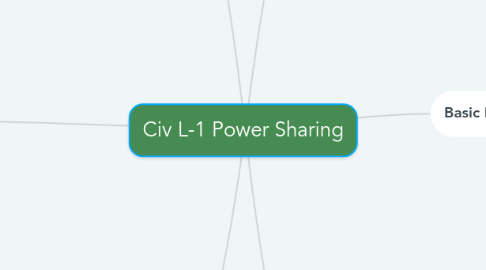
1. Belgium
1.1. Ethnic Compostition
1.1.1. Europian country surrounded by France, the Netherlands, Germany & Luxembourg.
1.1.2. Brussels is chosen as the Headquarter of Europian Union
1.1.3. In the country, Dutch are in majority and French are in minority
1.1.3.1. 59% speak Dutch & live in Flemish area
1.1.3.2. 40% speak French & live in Wallonia
1.1.3.3. Remaining 1% population speaks German
1.1.4. But in Capital City Brussels: 80% French and 20 % Dutch
1.2. Accommodation
1.2.1. New Political Arrangement
1.2.1.1. Between 1970 - 1993, constitution ammended four times
1.2.1.2. No unilateral decision can be taken by one community
1.2.1.3. State govts are not subordinate to the Central govt.
1.2.2. Three fold system of governance
1.2.2.1. Dutch and French ministers are equal in the central Govt
1.2.2.2. Brussels has a separate state govt with equal representation.
1.2.2.3. Community govt to resolve Culture, Language & Education related issues.
2. Why power sharing is desirable?
2.1. Prudential reasons
2.1.1. Reduces possibility of conflicts
2.1.2. Enables Political stability
2.1.3. Promotes Unity and integrity of a nation
2.1.4. Avoids domination of majority
2.2. Moral reasons
2.2.1. Saves the very spirit of democracy
2.2.2. Ensures Equal Participation of all
2.2.3. Protects Citizens' Right to be consulted
3. Important Terms
3.1. Ethnic : A social division based on shared culture wherein people believe in their common descent because of similarities of physical type or of culture or both. Not Necessarily of same religion or nationality
3.2. Civil War: A violent conflict between opposing groups within a country that becomes so intense that it appears like a war.
3.3. Majoritarianism : A belief that the majority community should be able to rule a country in whichever way it wants, by disregarding the wishes and needs of the minority.
3.4. Prudential : Based on prudence, or on careful calculation of gains and losses. Prudential decisions are usually contrasted with decisions based purely on moral considerations.
4. Sri Lanka
4.1. Ethnic Composition
4.1.1. It is an Island country in South Asia that Became independent in 1948
4.1.2. 74% Sinhala-speakers (Follow Buddhism)
4.1.3. 18% Tamil-speakers (Follow Hinduism/ Islam)
4.1.3.1. 13% Sri Lankan Tamils
4.1.3.2. Rest are Indian Tamils
4.1.3.3. Live in north and east of the country
4.1.4. 1% Muslims and 7 % Christians (speak Sinhalese+Tamil)
4.2. Accommodation
4.2.1. Majoritarianism by Sinhala
4.2.1.1. 1956 Act declared Sinhala as an official Language
4.2.1.2. Favoured Sinhala applicants for university positions & govt jobs
4.2.1.3. Fostered their religion of Buddhism
4.2.2. Conflicts amongst Communities
4.2.2.1. Feeling of alienation : Tamils had No political autonomy & recognition
4.2.2.2. Demand of Independent Tamil Eelam by Organizations like LTTE
4.2.2.3. Civil war led to Economic and human loss
5. Forms of Power Sharing
5.1. Horizontal Model of Power sharing
5.1.1. Amongst Different organs of government
5.1.2. Such as Legislature, Executive and Judiciary
5.1.3. The system of checks and balances
5.1.4. No unlimited powers to anyone
5.2. Vertical Model of Power sharing
5.2.1. Central government, State government, Local-self government
5.2.2. Constitutional division of power
5.2.3. Federal division of power amongst levels of govt.
5.2.4. Independently answerable to public
5.3. Power Sharing amongst Social groups
5.3.1. Accommodation of social diversities
5.3.2. To give representation to alienated, weaker sections of society
5.3.3. Eg. Community government in Belgium
5.3.4. Eg. Reserved Constituencies in India
5.4. Political parties and pressure groups
5.4.1. Political competition amongst various Contenders
5.4.2. Pressure groups influence the people in power
5.4.3. Politics of Alliance and Coalition govts.
5.4.4. Interest Groups/ associations like Businessmen, Workers, Industrialists
